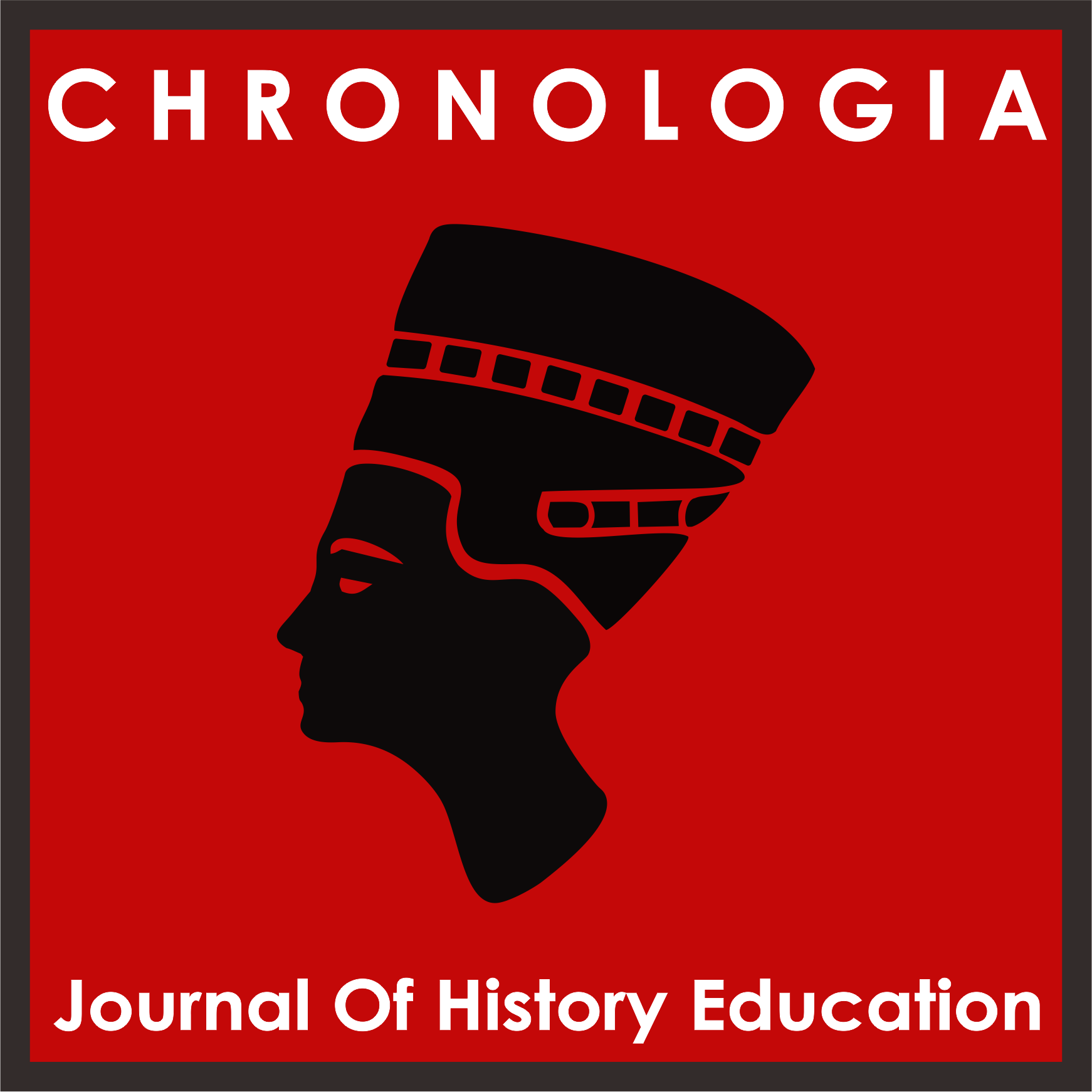Main Article Content
Abstract
Pancasila is a way of life of the Indonesian people. During its development, the New Order government made Pancasila the only principle. This government policy gave rise to protests by the community, especially Islamic mass organizations. As a result of the reaction of Islamic community organizations (ormas), the government considered that these movements rejected the Pancasila ideology and were dangerous for the unity of the country. One form of reaction to this government policy was the explosion of the 1984 Priok Incident. This incident occurred on September 12 1984. The method used is descriptive analytical historical research which consists of several stages, namely topic selection, source collection (heuristics), source criticism, interpretation, and historiography. The sources used are oral sources and written sources. The 1984 Priok incident cannot be separated from what is stated in the Collective Action Theory, namely a social movement based on certain interests and to achieve its goals, mobilization efforts or activities are carried out, while the nature of the action is reactive. In their efforts to prevent past humanitarian violations from being revealed, those responsible for security (security forces) in the period after the Priok incident tried to approach the victims, tried to cooperate and tried to get guarantees so that the 1984 Priok case would not be brought to court. This guarantee is applied in the form of peace called Ishlah.
Keywords
Article Details

This work is licensed under a Creative Commons Attribution 4.0 International License.
References
- Berita Acara Pendapat (Resume) kasus Priok dengan terdakwa Mayjend. Pranowo di Pengadilan Negeri Jakarta Pusat tahun 2001
- Berita Acara Pemeriksaan (Tempat Kejadian Perkara) dari Polres Jakarta Utara 13 September 1984.
- BPS Jakarta Utara tahun 1985 mengenai Perkembangan Wilayah Jakarta Utara 1985
- Fatwa, AM. (2005). Pengadilan HAM AD HOC Tanjung Priok: Pengungkapan Kebenaran Untuk Rekonsiliasi Nasional. Jakarta: Dharmapena.
- Feillard, Andree. (2008). NU vis a vis Negara. Yogyakarta: LkiS.
- Furchan, Arief. (1992). Pengantar Metode Penelitian Kualitatif. Surabaya: Usaha Nasional
- Gottschalk, Louis. 1986. Mengerti Sejarah. Terjemahan Nugroho Notosusanto. Jakarta: UI Press.
- Jones, Pip. (2009). Pengantar Teori-Teori Sosial. Jakarta: Yayasan Obor.
- Kompas, Jakarta 14 September 1984
- Kompas, Jakarta, 15 September 1984
- Kompas, Jakarta 16 September 1984
- Kuntowijoyo, 2001. Pengantar Ilmu Sejarah. Yogyakarta: Yayasan Bentang Budaya
- Mary Douglas,(2002) Kemurnian dan Bahaya: Sebuah Analisis Konsep Polusi dan Tabu Abingdon: Routledge.
- Muhammad, Akmaliah Wahyudi. 2009. Menggadaikan Ingatan; Politisasi Islah dalam Kasus Priok. Yogyakarta: Syarikat Indonesia.
- PSPI. 1998. Tanjung Priok Berdarah Tanggung Jawab Siapa. Sebuah Fakta dan Data. Jakarta: Gema Insani Press.
- Sinar Harapan, Jakarta, 14 September 1984
- Sinar Harapan, Jakarta, 15 September
- Sjamsuddin, H. 1996. Metodologi Sejarah. Jakarta: Depdikbud.
- Suharko, (2006). Gerakan Sosial Baru di Indonesia: Repertoar Gerakan Petani. Jurnal Ilmu Sosial dan Ilmu Politik.
- Tanuredjo, Budiman. (2003). Militer Dan Penyelesaian Pelanggaran HAM Era Soeharto (Studi Kasus Tanjung Priok dan Kasus 27 Juli 1996). Tesis. Bidang Ilmu Politik UI. Tidak diterbitkan.
- Tempo, Jakarta, 22 September 1984
- Tilly, Charles. (1978). From Mobilization to Revolution. Philippines: Addison Wesly Publishing Company Inc.
- Tim Nasional Penulisan Sejarah Indonesia. (2007). Sejarah Nasional Indonesia VI. Jakarta: Balai Pustaka.
References
Berita Acara Pendapat (Resume) kasus Priok dengan terdakwa Mayjend. Pranowo di Pengadilan Negeri Jakarta Pusat tahun 2001
Berita Acara Pemeriksaan (Tempat Kejadian Perkara) dari Polres Jakarta Utara 13 September 1984.
BPS Jakarta Utara tahun 1985 mengenai Perkembangan Wilayah Jakarta Utara 1985
Fatwa, AM. (2005). Pengadilan HAM AD HOC Tanjung Priok: Pengungkapan Kebenaran Untuk Rekonsiliasi Nasional. Jakarta: Dharmapena.
Feillard, Andree. (2008). NU vis a vis Negara. Yogyakarta: LkiS.
Furchan, Arief. (1992). Pengantar Metode Penelitian Kualitatif. Surabaya: Usaha Nasional
Gottschalk, Louis. 1986. Mengerti Sejarah. Terjemahan Nugroho Notosusanto. Jakarta: UI Press.
Jones, Pip. (2009). Pengantar Teori-Teori Sosial. Jakarta: Yayasan Obor.
Kompas, Jakarta 14 September 1984
Kompas, Jakarta, 15 September 1984
Kompas, Jakarta 16 September 1984
Kuntowijoyo, 2001. Pengantar Ilmu Sejarah. Yogyakarta: Yayasan Bentang Budaya
Mary Douglas,(2002) Kemurnian dan Bahaya: Sebuah Analisis Konsep Polusi dan Tabu Abingdon: Routledge.
Muhammad, Akmaliah Wahyudi. 2009. Menggadaikan Ingatan; Politisasi Islah dalam Kasus Priok. Yogyakarta: Syarikat Indonesia.
PSPI. 1998. Tanjung Priok Berdarah Tanggung Jawab Siapa. Sebuah Fakta dan Data. Jakarta: Gema Insani Press.
Sinar Harapan, Jakarta, 14 September 1984
Sinar Harapan, Jakarta, 15 September
Sjamsuddin, H. 1996. Metodologi Sejarah. Jakarta: Depdikbud.
Suharko, (2006). Gerakan Sosial Baru di Indonesia: Repertoar Gerakan Petani. Jurnal Ilmu Sosial dan Ilmu Politik.
Tanuredjo, Budiman. (2003). Militer Dan Penyelesaian Pelanggaran HAM Era Soeharto (Studi Kasus Tanjung Priok dan Kasus 27 Juli 1996). Tesis. Bidang Ilmu Politik UI. Tidak diterbitkan.
Tempo, Jakarta, 22 September 1984
Tilly, Charles. (1978). From Mobilization to Revolution. Philippines: Addison Wesly Publishing Company Inc.
Tim Nasional Penulisan Sejarah Indonesia. (2007). Sejarah Nasional Indonesia VI. Jakarta: Balai Pustaka.

